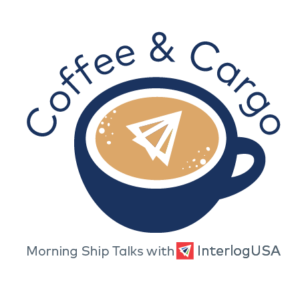Competitive Edge
April 27th, 2022
Stay Current with Interlog’s Weekly Newsletter:
Sign up for our next Coffee & Cargo webinar –> CLICK HERE
To watch last week’s webinar –-> CLICK HERE
Any topics you want discussed in our next webinar? –-> EMAIL US TODAY

Ocean Freight Market Update
Headlines
- The Journal of Commerce reports that shippers and carriers are facing lengthening vessel wait times at China’s Ningbo as facilities at the world’s third-busiest container port become congested with cargo diverted from Shanghai, now entering the fourth week of an indefinite COVID-19 lockdown. See below for more of the latest updates.
- Container line ZIM is launching its first ro-ro service from the Chinese port of Guangzhou to South America, courtesy of Seatrade Maritime News.
- Los Angeles and Long Beach ports announced April 22 that they will delay consideration of the “Container Dwell Fee” for another week (until April 29). Since the program was announced last October, the two ports have seen a combined decline of 49 percent in aging cargo on the docks.
UPDATE: Notable U.S./Canada Port Congestion as of 04/26/22
- Vancouver: 54 Backlogged Vessels
- Norfolk/Newport News: 48 Backlogged Vessels
- Los Angeles/Long Beach: 46 Backlogged Vessels
- Houston: 36 Backlogged Vessels
- New York/Newark: 26 Backlogged Vessels
- Baltimore: 25 Backlogged Vessels
- San Francisco/Oakland: 22 Backlogged Vessels
- Savannah: 15 Backlogged Vessels
- Charleston: 14 Backlogged Vessels
IMPORT: Asia to North America (TPEB)
Recent Developments:
- Courtesy of Triple Eagle (Group) LTD, lockdown measures in Shanghai are still imposed however terminals also remain in operation. Partial road closures and PCR test requirements for truckers have continued to adversely impact the freight trucking industry in the region.
- Some factories throughout Shanghai have reopened and if the situation continues to improve, all COVID-related measures may be repealed following China’s labor holiday (April 30 through May 4), according to Triple Eagle (Group) LTD.
- Additionally, Triple Eagle (Group) LTD reports that all warehouses in the Ningbo area are completely booked at this time. Trucks must wait for their cargo to be unloaded, which can take up to 48 hours. Delays are expected for LCL and Consol services.
- The usual suspects—severe congestion, deteriorating schedule integrity, port omissions, and blank sailings—remain contributors to an uncertain market.
Rates: Rate levels remain relatively elevated. Premium market remains strong.
Space: Space remains critical and is expected to stay tight.
Capacity/Equipment: Capacity remains severely under. Equipment deficits remain critical.
TIPS: Book at least 4 weeks prior to CRD. Strongly consider premium service and be flexible as it comes to equipment and routing. Additionally, be in contact with suppliers to check up on any COVID-related developments that can affect production.
IMPORT: Europe to North America (TAWB)
Recent Developments:
- USEC congestion remains considerable.
- USWC ports remain significantly congested as well. However, wait times for vessels have cut down to 20 days at Los Angeles/Long Beach ports.
Rates: Rates levels remain elevated and are expected to increase during Q2 with GRIs and PSSs.
Space: Space is critical for USEC and USWC.
- Capacity/Equipment: Capacity remains tight for both North Europe and Mediterranean services. Equipment availability at ports, however shortages are still being reported at European inland terminals.
TIPS: Book 5 or more weeks prior to CRD. Strongly consider premium service for better reliability and no-roll options for your cargo.
EXPORT: North America to Asia
Recent Developments:
- Diminishing schedule integrity is contributing to void sailings, delays, vessel cut-offs at ports, and challenging post earliest return dates.
- For USEC, Port of Savannah operations continue to see improvements.
- The Port of Charleston remains congested and at continued risk for omissions.
- Vessel arrivals remain fluid for USWC POLs.
Rates: GRI activity (limited) announced into April and early May.
Capacity: Available capacity remains fluid for USWC POLs.
Equipment: IPI origins remain adversely affected by deficits on containers and chassis. Primarily, a lack of rail equipment has become a predicament for the USWC.
TIPS: Book 4 to 6 weeks prior to CRD to secure equipment and vessel space.
China Covid-19 Update as of 4/26/22
Shanghai
- Shanghai’s new infections fell around 13 percent to 16,980 on April 25, while cases with symptoms declined by almost a third to 1,661.
Ports: The Port of Shanghai assumes regular operations and laden containers are allowed to gate in. However, vessel loading has decreased drastically. This has led to some carriers not calling on stops at the port.
Trucking: All truck drivers are requested to provide a negative PCR Covid test before entering Shanghai.
- FCL Trucking operations are still operating as normal, but quarantine regulations and enforcements have limited the mobility of truck drivers significantly.
- LCL Trucking operations are greatly affected as warehouses are not accepting cargo to be gated in.
Customs: All operations are normal.
Warehouses: Shanghai warehouses are not accepting and gating in cargo during the lockdown period.
Ningbo
Ports: The Port of Ningbo assumes regular operations.
Trucking: An uptick in recent confirmed Covid cases were mainly spread by truck drivers. In response, local authorities are closely monitoring all truck drivers and have imposed strict regulations for those coming in and out of the city. The efficiency of trucking operations has been severely affected.
Customs: All operations are normal.
Warehouses: Operations at Ningbo warehouse have been challenged with inefficiencies stemming from frequent PCR testing requirements for warehouse employees and truck drivers. Reductions in operation capacity have also been a determiner.
Shenzhen, Xiamen, Qingdao, Hong Kong
- Xiamen – Quanzhou’s risk level changed from medium to low. Shippers can now deliver cargo to Xiamen ports without Covid-related restrictions.
- Hong Kong – From April 21, local authorities in Hong Kong have eased its social-distancing measures.
Ports: All operations are normal.
Trucking: All operations are normal.
Customs: All operations are normal.
Warehouse: All operations are normal.
Beijing
- Beijing added 33 confirmed Covid cases on April 25, likely shifting the focus of zero-Covid measures onto the Chinese capital.
- Through April 26 to April 30, Beijing will conduct three rounds of PCR tests for all residents in 11 of the city’s 16 districts.
- This includes its most populous districts of Chaoyang, Haidian, and Fengtai.
- Work-from-home orders have been implemented all throughout the city.
- Results from the rounds of PCR testing will determine whether stricter lockdown measures will be imposed that will cause significant disruptions to daily life.
Source: AEL Berkman
Did You Know: USWC Longshore Labor Union Talks
As the current contract is set to expire on July 1st, many involved in the USWC longshore labor union port contracts, feel rather optimistic that contract discussions won’t disrupt operations at the ports.
We will continue to monitor and provide updates on this ongoing situation.
Source: Transport Topics
Freight News
Volume and service have been issues for CSX and Union Pacific, as both those issues have hit declines in 2022
CSX Transportation and Union Pacific both blame labor shortages as the reason volume and service have hit declines in 2022. Union Pacific saw quarter 1 (Q1) intermodal volume drop 5 percent year-over-year, while CSX saw a 1 percent decline, the Journal of Commerce reports.
Intermodal volume dropped in Q1 because of a decline in international cargo (known as IPI), with ocean carriers on the fence about moving too many containers inland on trains, the JOC reports.
The need for people in the engineer and conductor ranks remain high. CSX remains firm that they are not short of locomotives, or any physical infrastructure to be able to perform. The one thing they are short of right now is more engineers and conductors.
In addition to labor shortages, CSX did not have enough resources to deal with the winter conditions in February – which was a cause for inventory build up and customers putting more railcars on the networks to cover their needs, the Loadstar said.
The Biden Administration has been looking into ways it can better prepare and attract people to work on railroads, as the turnover has been above normal levels – the JOC reports.
In Q1, U.S. Imports from Asia continued to increase, as did consumer demand even amidst inflation
In Quarter 1, data has shown continued strength in consumer demand, even with alerts of inflation increasing. This has had a direct impact on U.S. Ports, especially on the U.S. East Coast as vessel backlogs have been a consistent issue.
In the first three months of 2022, total volumes from Asia have increased 2.7 percent to 1.62 million twenty foot equivalent units (TEUS), from last year which was a record setting year itself then too, the Journal of Commerce reports.
How this impacts the coming months at the terminals… if imports continue to increase or remain leveled on a year-over-year basis in the second quarter, U.S. gateways will contend with cargo volumes that challenge their port-related supply chains, the JOC says.
At USWC ports, regarding import volumes from Asia, have seen a slight decline. At Los Angeles/Long Beach ports, those volumes in Q1 declined almost 4 percent from Q1 in 2021, Northwest Seaport Alliance of Seattle and Tacoma saw volumes for that same time frame ease 0.1 percent, and at the Oakland port they saw a decline of 2 percent for that same time frame, according to the JOC.
However, on the USEC ports and the gulf coast, regarding import volumes from Asia, have seen a significant growth in the first quarter. Compared to Q1 in 2021, Asian imports increased almost 9 percent in New York-New Jersey, a little over 9 percent in Savannah, up 52.1 (!!) percent in Houston, 12.5 percent in Norfolk and 26 percent in Charleston, according to the JOC.
Blog Of The Week

CMA CGM Will Not Accept Plastic Waste on Board its Vessels, Effective April 15
Watch Last Week's Webinar:

We discussed a variety of topics including the Shanghai lockdowns and what the aftermath looks like, global restocking, congestion at U.S. ports, current events, and a live Q&A with our experts!
Sign up for our
industry answers
Our team works to provide valuable, unique, and relevant content to assist you in finding solutions. Sign up now.